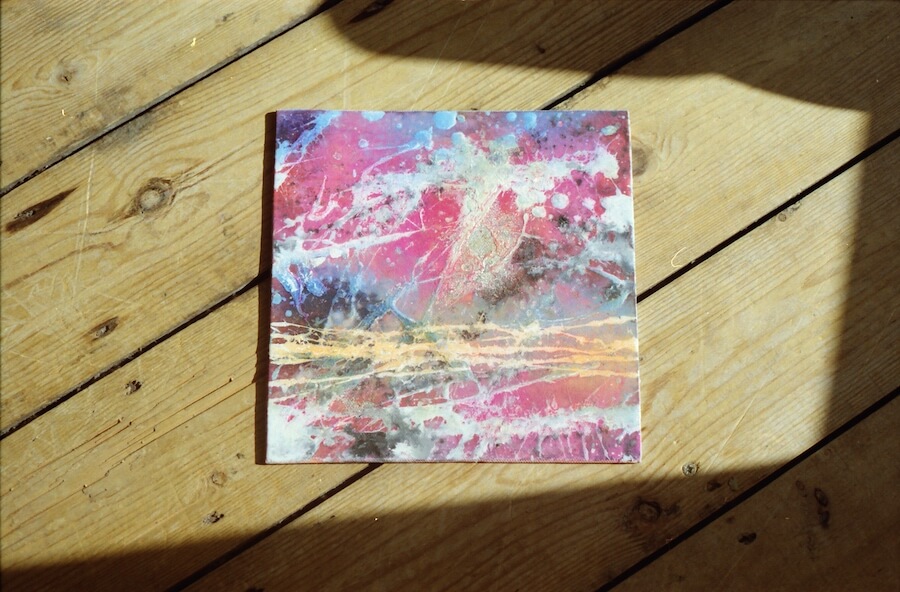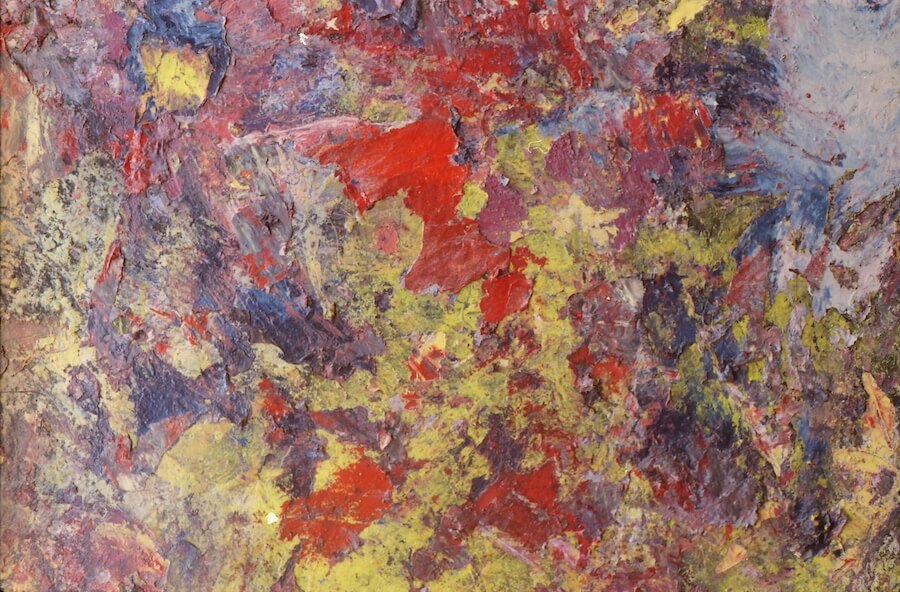Jack Coulter is an Irish abstract expressionist painter and photographer. Born in 1994, Jack has been painting since he was a child. He has synesthesia which he channels into each of his paintings making his work unforgettably emotive and unique. We caught up with Jack to discuss his work and what he has going on at the moment and were lucky enough to get a real insight into his life and thoughts on the world we live in!
KALTBLUT: Hi Jack, how are you? What have you got going on at the moment?
Jack: “How are you” is a vital question in life; although few individuals speak in truthful conviction. At this moment, I could give you an artificial answer of dead falsity; although, presently – I fear for humanity; societal systems are detrimental to the future of our planet, we are more concerned with unconscious realms of nothingness.
KALTBLUT: When did you begin painting?
Jack: Ever since I was a child; I was brought up around abstract art – my aunt Christine’s work was in every room of my house, as were vastly dominant works of post-war 1940s abstract expressionism. No matter what happened in life, I always knew that painting would always be there for me. Since I was a child; I recurrently woke in the night – yearning for an existent ‘something’ void, I could never fill it—I found that ‘something’ in painting. I specifically remember my school teacher when I was 11 years old asking me “Have you always painted like that?” (After homework was set to draw from life). Every student had these beautifully drawn bowls of fruit and portraits of family members; I had literally immersed my double page in colour – I covered each page in second-hand house-paint that I found in my garage. I thought that I was in trouble for expressing emotionality rather than representational means – I painted ‘life’ in my terms; self-expression within abstraction was all I knew.
KALTBLUT: How would you describe the aesthetic of your paintings?
Jack: My work arises from a previously unborn life form; never from an existence which contrives a ‘pure’ state of psychic automatism. The musical presence is clear; I recently provided the artwork for SOAK’s debut album ‘Before we forgot how to dream’.
KALTBLUT: You’ve mentioned your aunt as a big influence on your artwork, could you tell us a little bit about her and the prints she made and how she inspired your paintings?
Jack: In my eyes, she was the greatest painter – her works exterior held piercing polychrome visualisations, paralleled within elusive interior darkness, which one can only perceive in observance; an incredible mind, she was an abstract printmaker. My mum had her prints exhibited in every room of my house – they are breathtaking compositions. To have her embrace my artwork from such an early age was vital; young minds are brittle – disbelief can arise from just one individual’s opinion. Whilst living in Germany; she once had dinner with Georg Baselitz – he was lucky to have met her, she always believed in me – even when no one else did. She sadly died the day before I began art college.
KALTBLUT: Who would you say are your other artistic influences?
Jack: In terms of art history; the list is endless – 1940s post-war abstract expressionism; Pollock, Rothko, De Kooning, Kline, Motherwell, Newman. Also; various second-generation painters – Sam Francis, Joan Mitchell, Helen Frankenthaler, Morris Louis. I also love Stuart Sutcliffe’s work – his artistic genius was lost amongst The Beatles; he died at 21 years old; he was a gifted colourist. No living artist inspires me. I adore Frida Kahlo’s diary – a visual representation of her mind; her illustrations are beautiful – pain depictions. “I love you more than my own skin.” Jean-Michel Basquiat; genius child – revolutionised the ‘artist’ stereotype; I wish that I could have met him. Inspiration comes in all forms; Rimbaud’s ‘Ophelia’ once inspired me to paint; as did various Burroughs cut-ups. I immerse myself within oneirology; ‘The Interpretation of Dreams’ is a favourite of mine; I am fascinated by Freud’s psychodynamic approach to psychology – one’s mind is rarely conditioned. I recently visited Pollock’s Blind spots’ exhibition in Liverpool – it was a very emotional experience; I cried a lot. I could barely hold it together, it unearthed suppressed emotion within me – art is metaphysically non-existent, yet it fascinates every inch of my being.


KALTBLUT: When did you discover that you had synesthesia, and in what way does it affect you and the art you produce?
Jack: As a child; I had recurring colour induced hallucinations; which were heightened in the presence of ambience – living within internal or external perception. I rarely spoke as a child; I could never articulate my visualisations – let along explain to an adult of a cognitive, neurological, sensory condition. Many individuals ask if it takes over my life; it is a prominent aspect of my day to day being – it lives in harmony with my beating heart.
KALTBLUT: What do you think the most interesting thing about your synesthesia is?
Jack: The fact that I am living physically, intrinsically, extrinsically within a polychrome world; it’s a beautiful poison one cannot share with another – an embodiment of personal idealisations held within life’s iridescent chromaticity. I live in colour; I’ll die in colour.
KALTBLUT: Your paintings and photographs all express real raw emotion – how does your mood affect your choices in creating a piece?
Jack: ‘Art’ as an entity, saved my life; if I hadn’t discovered the psychological release held within the complexities of the intricately illustrious mind, I may have been misguided into an artless, stifled, falsified existence. The emotion resonates within the viewer; I have little control over the cognitive emotionality – personal relations/translations with individuals are inevitable. A girl messaged me saying that she is getting my artwork tattooed on her neck; it’s surreal.

KALTBLUT: Are you still painting in your garage, and how long does it usually take you to produce a painting, from the initial idea to the finished piece?
Jack: I have been painting in my garage since I was a child; I never work from a pre-conceived idea, the affirmation of ‘beauty’ as such resides within the expression of the unconscious. The spontaneity arrives from my own original musical compositions—I paint to music, in loveless silence.
KALTBLUT: Do you start with a title for a painting or does that come later?
Jack: It always comes after the painting; although in one case, I had a title set: ‘eulogy’ – it was for a canvas that my aunt Christine left for me to paint before she died, it is merely the sole form of dispositional gratitude that I could express towards her.
KALTBLUT: I’ve read a few of the things you’ve written, you seem to be pretty clued up about the ways of the world, would you say you are quite political or philosophical?
Jack: I’m awake; conscious within an unconscious society – if one’s mind remains closed in perception – one may as well be dead. Awakening is forever imminent; one must be willing to live a life of self-discovery, painful acquisition, ambient awakenings; one must not exist within an unconscious fallacy of delusion.

KALTBLUT: Your writing is really poetic; do you find the act of writing as a means of expression as important to you as painting? Or are the two more separate for you?
Jack: My art has always been a personal form of expression; a release – my paintings where only for me to view – now, the world is exposed to my workings. I receive thousands of messages online; I once received a devastating message which left me in pieces. I have never mentioned it to anyone as it is a heartbreaking yet, experiential subject – an anonymous girl told me that; she was about to take her own life, then she saw one of my paintings online and it changed her mind. It made me cry – if my sole life’s purpose was for that one moment to arise; I will forever be serene. Personally, statistical validation has no relevance to how credible the artwork is; prosperity beholds the utmost value. The pursuit of fame, materialism and artificial stimulation are pain measuring societal concepts. We are taught by individuals – mere victims of subliminal rules set by their predecessors; we exist within a perpetual cycle of expulsion – permissive minds expose undeniable glorification of purity, truth, complexly enigmatic cognition. The idealism of ‘happiness’ – in its rawest pursuit, are psychologically replaced by generational obsessions with fame, materialism, commerce – each an extension of escapism where depressive nature resides – leading to dead living.
KALTBLUT: What else have you got coming up at the moment?
Jack: Everything regarding my artwork is in production; I’m extremely excited – the individuals that truly love my work will soon be able to have it in their hands.
Interview by Rosie Bunsall
Contact:








